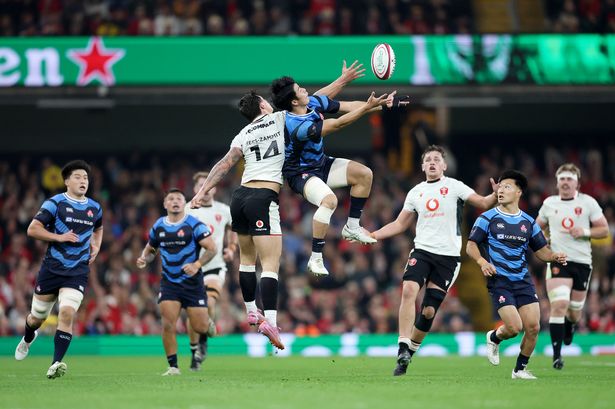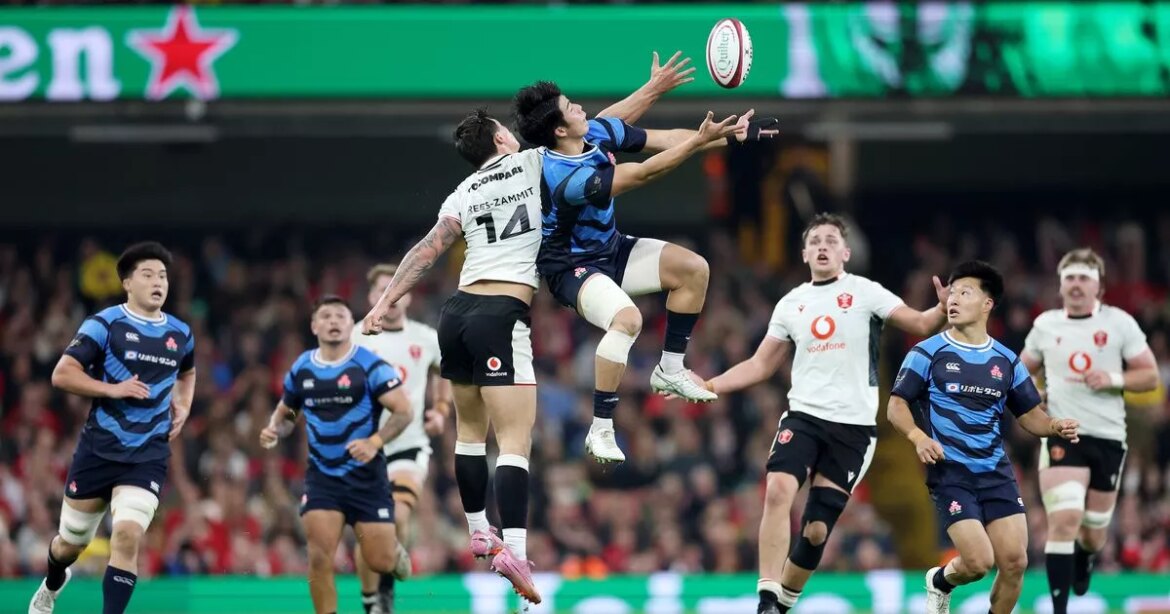Wales and Japan’s Rugby World Cup draw fate likely comes down to this match Louis Rees-Zammit of Wales and Yoshitaka Yazaki of Japan battle for a high ball(Image: 2025 Getty Images)
Louis Rees-Zammit of Wales and Yoshitaka Yazaki of Japan battle for a high ball(Image: 2025 Getty Images)
Wales v Japan is a game of huge importance for both teams, with the 2027 Rugby World Cup draw just a few weeks away.
The groups will be announced on December 3 at a ceremony in Sydney, and who plays who will be decided on rankings positions at the end of the autumn internationals.
Wales are currently 12th and Japan are just one place behind in 13th. You can follow Wales v Japan live here.
The top six sides will be placed in Band 1 of the World Cup seedings, while the sides placed seventh to 12th will be in Band 2. Those outside of that will be in the third tier and could be thrown into a World Cup group of death.
Staying in the top two bands is crucial for sides hoping to be handed a favourable group draw.
A Wales win over Japan will secure 12th spot and the crucial second seed status.
If Wales lose, they will be consigned to 13th when the draw is made, unless they can pull of a miracle win over New Zealand or South Africa over the next fortnight.
If the game ends in a draw, Wales will drop to 13th today and need Georgia, currently 11th, to beat Japan next week, or hope Japan win by more than 15 points. A narrow Japan win against the Georgians will consign Wales to 13th still.
In terms of the World Cup, there will be more teams and a new round of 16 before the quarter-finals in 2027. There will now be six pools with four teams in each. The top two teams from each pool will progress to the round of 16, while the four best third-place teams will also progress
Instead of 48 matches like we had at the last Men’s Rugby World Cup, we now have 52 games. In previous formats, the quarter-finalists would just be the winners of each pool against the runners-up of another pool. With six pools now feeding 16 spots in the first round of the knockouts, that requires some changes.
The teams that finish top of Pool A, B, C and D will face a third-place team in the round of 16, while the teams that finish top of Pool E and F will face teams that finished second in their pool.
Likewise, some teams that finished second in their pool may face the winner of another pool, while some will face the runners-up.
While on the surface that may seem slightly unfair, that imbalance is addressed in the next round. Let’s take Pool A and Pool E as an example. The team that wins Pool A will face a third-place team in the round of 16, but in the quarter-finals could potentially meet the winner of Pool B if that team wins their round of 16 match.
On the other hand, the team that wins Pool E will face a runner-up rather than a third-place team in the round of 16, but in the quarter-finals would face the winner of a quarter-final between two other runners-up. So while the winner of Pool A would face a third-ranked team and then potentially a top-ranked team in their games, the winner of Pool E would face second-ranked teams in both games.
There’s therefore no advantage or disadvantage to be gained or lost regardless of your team’s raking at the end of the pool stage, it will all even out in the end.


AloJapan.com